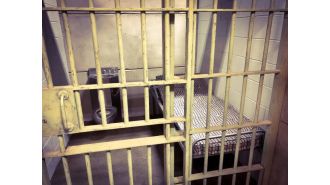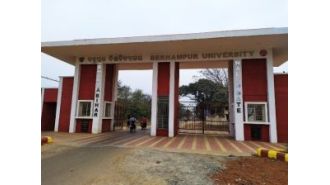33 Years After Dubious Evidence Helped Convict Him, Joe Bryan Has Been Released on Parole
His murder conviction rested largely on bloodstain-pattern analysis, a technique still in use throughout the criminal justice system, despite concerns about its reliability.

On Tuesday, Joe Bryan was released from prison after 33 years behind bars. “Thank you, Father, for taking care of me,” he said, extending his hand toward the sky, his voice choking with emotion. “Hallelujah, praise Jesus!”
Bryan’s attorneys and a large group of family members had waited outside the Texas State Penitentiary in Huntsville for hours in cold, gloomy weather, craning for a view of the 79-year-old. Shortly before 11 a.m., as the sun burst through the clouds, parolees began to emerge from the prison, filing past the monolithic, red-brick structure that is home to the state’s execution chamber. Bryan looked uncertainly ahead of him until he spotted familiar faces, then broke into a wide grin. A small bag, which a younger parolee carried for him, held all of his possessions.
Bryan, the subject of a ProPublica-New York Times Magazine investigation that questioned the integrity of the expert forensic testimony used to convict him, has always maintained that he had no part in the 1985 shooting death of his wife, Mickey. Bryan was twice convicted of her murder, which took place in their Clifton, Texas, home.
Bryan, then a high school principal, had been attending an education conference in Austin, 120 miles away, in the days surrounding the murder. By his account, he was asleep in his hotel at the time of the crime. His conviction rested largely on bloodstain-pattern analysis, a technique still in use throughout the criminal justice system, despite serious concerns about its reliability.
Bryan first became eligible for parole in 2007, after serving 20 years in prison. In the intervening years, the Texas Board of Pardons and Paroles denied him parole on seven occasions, despite his sterling disciplinary record. Bryan suffers from congestive heart failure, and the board’s prior refusal to release him was seen as all but guaranteeing that he would die in prison.
This spring, after Bryan came up for review an eighth time, the board reversed course, and on March 19, it agreed to parole him. The reason for the board’s change of heart is unknown; its deliberations are confidential and exempt from state open-record laws. But its actions followed a concerted effort by his parole attorneys, Allen and Shea Place, and his family to win his release.
Bryan’s supporters, who wrote to the parole board on his behalf, included bestselling author John Grisham, who learned about Bryan’s case from the ProPublica-Times investigation. The plot of Grisham’s 2019 thriller, “The Guardians,” was based in part on Bryan’s story. “I strongly believe Joe is innocent,” Grisham wrote to the board. “Please do not allow Joe to die in prison.”
Bryan’s case has served as a warning about the unreliability of bloodstain-pattern analysis and the scant training that some of its practitioners receive.
At an evidentiary hearing in 2018 in Comanche, Texas, his attorneys presented evidence that the forensic testimony used to convict him was erroneous. In a sworn affidavit submitted to the court, retired police Det. Robert Thorman, who performed the bloodstain-pattern analysis in the case, wrote: “My conclusions were wrong. ... Some of the techniques and methodology were incorrect. Therefore, some of my testimony was not correct.”
That same year, the Texas Forensic Science Commission — which investigates complaints about the misuse of forensic testimony and evidence in criminal cases — announced that the bloodstain-pattern analysis used to convict Bryan was “not accurate or scientifically supported.”
Concerns about the forensic testimony in Bryan’s case inspired the commission to develop a new licensing program for analysts who perform crime scene reconstruction. “Mr. Bryan’s case shows that we need to be ever-vigilant to ensure the forensic science put in front of judges and juries is based on science and not conjecture,” Lynn Garcia, the commission’s general counsel, said on Tuesday.
Bryan, meanwhile, is returning to a world transformed. He last walked free in the 1980s, when George H.W. Bush was president, before cellphones and the internet revolutionized everyday life. His release comes at an especially precarious time, when a stay-at-home order is in place to slow the spread of COVID-19 in Houston, where he will be living with his eldest brother, James, and James’ wife, Joretta. Bryan was not aware of those restrictions — or basic facts about the spread of the virus — when he spoke with his brother on Monday night.
Returning home at a time of social distancing will be difficult, as was evident on Tuesday, when Bryan’s family members and attorneys, moved to tears at the sight of him, leaned in to embrace him. His family had hoped to celebrate Bryan’s release with a large gathering that would include all four generations of their family, but instead opted to bring him home with little fanfare.
James explained that his brother will make peace with the current restrictions, given that Bryan’s greatest desire did not involve venturing out. “Joe told me he would really like to just play our piano — but only if the sound didn’t bother me and Joretta,” James said, chuckling.
“We’re very grateful,” he added. “Bringing Joe home is the first step. The second step is making sure he is exonerated.”
The next phase of litigation in Bryan’s case will be in the federal courts. The Innocence Clinic at Texas Tech University School of Law, in partnership with the Innocence Project of Texas and Bryan’s longtime attorney Jessica Freud, plans to file a federal appeal in Bryan’s case. Last month, the clinic’s four law students met with Bryan in prison, in Beaumont, Texas. “These are four very critical thinkers,” said Allison Clayton, the clinic’s director. “And they walked away not only convinced of his innocence but energized to put in the work to prove it.”
Bosque County District Attorney Adam Sibley declined to comment on the parole board’s decision or how his office will respond to Bryan’s future appeals.
Freud expressed her relief that her client was being released just as the first cases of COVID-19 in Texas prisons are being confirmed. “I’m very thankful that Joe has been paroled, as he is a higher risk for severe illness from the virus because of his age and heart condition,” she said. But her tone was sober as she assessed what he was leaving behind. “There are many people like Joe, who are trapped in prison and will get sick if not paroled,” she said. “Hopefully there will be legislative and executive action to reduce our incarcerated populations before it’s too late.”






